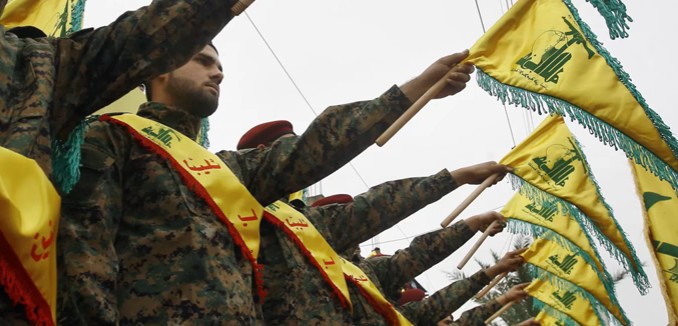The Iran-backed terrorist group Hezbollah is “now more militarily powerful than most North Atlantic Treaty Organization members,” a former Israeli ambassador to the United Nations wrote in an op-ed published Monday in The Wall Street Journal.
Hezbollah is now “10 times as strong now as it was in 2006, and its military infrastructure permeates Lebanon,” Ron Prosor observed. This is in violation of the “thoroughly ineffective” UN Security Council resolution 1701, which was adopted to end the 2006 Lebanon War and called for the UN Interim Force in Lebanon (UNIFIL) to keep the country’s south “free of any armed personnel, assets and weapons.”
Hezbollah has thoroughly defied 1701, acquiring an estimated 150,000 missiles — more than the combined arsenals of 27 NATO nations — with a range capable of striking “anywhere in Israel” and the ability to “launch 1,500 of them a day,” Prosor wrote. Lebanon’s newly installed president Michael Aoun has also “embraced” Hezbollah’s arsenal as “a principal element of Lebanon’s defense.”
Nonetheless, Hezbollah acts “with Iran’s interests in mind—not Lebanon’s,” and if it forces a war on Israel, it will not care about the resulting damage to Lebanon, Prosor pointed out. He pointed to Hezbollah’s support of the Syrian government as an example, which has led it to unleash “genocide against the Sunni Arab population.”
In order to prevent a future war with Hezbollah, the United States will have to pressure the Security Council to strengthen and enforce resolution 1701, in line with Chapter 7 of the UN’s charter, which mandates peace enforcement. The U.S. could also make its 43 percent contribution to UNIFIL’s $488 million annual budget contingent on its effectiveness in keeping arms out of southern Lebanon.
“War between Lebanon and Israel would be detrimental to Russian interests in Syria, so Vladimir Putin could be convinced to help rein in Hezbollah,” Prosor added. Sunni Arab states such as Egypt and Saudi Arabia also seek to contain Hezbollah and Iran, while “Western Europe should be eager to avoid a war that would worsen its refugee crisis.”
By taking the lead and moving diplomatically at the UN to disarm Hebollah, the U.S. could “prevent the need to make terrible decisions about U.S. military intervention tomorrow,” Prosor concluded.
Brig. Gen. (res.) Nitzan Nuriel, a former director of Israel’s Counter-Terrorism Bureau, said in March that another war between Israel and Hezbollah was “only a question of time.” A week later, IDF Chief of Staff Lt. Gen. Gadi Eisenkot assessed that Hezbollah is building up its arsenal in Lebanon, which will bear the brunt of any future conflict between the Iranian proxy and Israel. Israeli security officials warned earlier in March that the Lebanese army would fight alongside Hezbollah in a war against Israel.
Hezbollah’s leader Hassan Nasrallah admitted in June 2016 that Iran provides his terrorist group with everything it needs. “We are open about the fact that Hezbollah’s budget, its income, its expenses, everything it eats and drinks, its weapons and rockets, are from the Islamic Republic of Iran,” Nasrallah said. “As long as Iran has money, we have money… Just as we receive the rockets that we use to threaten Israel, we are receiving our money. No law will prevent us from receiving it.”
Nasrallah’s acknowledgement of Iranian aid seems to confirm a public assurance given to him in August 2015 by Iranian Foreign Minister Mohammad Javad Zarif that the nuclear deal Iran reached with global powers presented “a historic opportunity” to confront Israel. Iran recently announced that its defense spending would increase by 90 percent in the coming year.
According to a July 2016 report by the Foundation for Defense of Democracies, Israeli officials believe that any future war with Hezbollah has the potential to cause “thousands of civilian deaths” in Israel. Hezbollah has, among other things, threatened to attack ammonium tanks in Haifa, which could kill tens of thousands of people.
Jonathan Schanzer, senior vice president of the Foundation for Defense of Democracies, explained that month that Hezbollah’s widely-reported tactic of hiding military assets in civilian areas would lead to mass casualties. Reports emerged in 2013 that Hezbollah was offering reduced-price housing to Shiite families who allowed the terrorist group to store rocket launchers in their homes. An Israeli defense official told The New York Times in May 2015 that the buildup of Hezbollah’s terror infrastructure in southern Lebanese villages meant that “civilians are living in a military compound” and that their lives were at risk. A few days later, a newspaper linked to Hezbollah bolstered the Israeli assessment.
[Photo: AIPAC / YouTube ]




